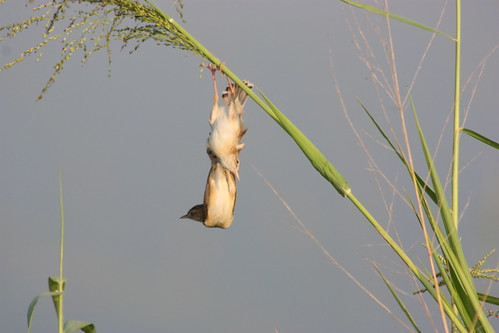....some Grey Seals, and a Crossbill.
Zitting Cisticola. Copyright Farash Samat.
I don't think I've ever been more amazed at any photograph of birds like this one ever before. The image depicts a pair of Zitting Cisticola, having mated they are photographed in this amazing 'post-coital trapeze act' having dropped into this inverted position the female clings on to the grass stem, with the male - also upside-down - holding on to her at the shoulder. Apparently this is a post-copulation behaviour normal to the species whereby the male grips the females back tightly after coition, perhaps in a bid to increase the likelihood of fertilisation.
The first record of the Zitting Cisticola in Ireland was a bird found in Co. Cork in 1962 by an observer who had already seen the species in Spain only a few months previous. The first record for Britain was in Norfolk in 1976, then five days later at another location in Norfolk and regarded then as being almost certainly the same individual. It is interesting that despite the close proximity of breeding birds to Britain, the Zitting Cisticola appears to be reluctant to cross the North sea.
The first record of the Zitting Cisticola in Ireland was a bird found in Co. Cork in 1962 by an observer who had already seen the species in Spain only a few months previous. The first record for Britain was in Norfolk in 1976, then five days later at another location in Norfolk and regarded then as being almost certainly the same individual. It is interesting that despite the close proximity of breeding birds to Britain, the Zitting Cisticola appears to be reluctant to cross the North sea.
Well, I've often been seen to quote on Birds2blog....'Birds, they fascinate me in a thousand ways'....but never quite like this before.
Grey Seal. Gary Jones.
Grey Seals. Gary Jones.
Gary has been on a recent trip to the Farne Islands and brought home a 'bag full' of images to share with us. Please visit Gary's Website to see an excellent selection of photographs of these wonderful creatures with the promise from him of an upload of sea birds at the Farnes sometime soon.
Two-barred Crossbill. Gary Jenkins.
Gary went to see THIS BIRD in Yorkshire in 2008, but I don't think it would be a good idea for most of us to hold our breath until we find one for ourselves. The first record of this species in Ireland was in Co. Antrim in 1802, the first for Britain was in North Yorkshire in 1826.




No comments:
Post a Comment